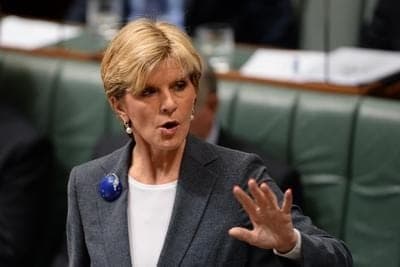
The federal government will advise Islamic counterparts there is no shift to its Middle East policy as it seeks to calm an “overreaction” to its decision to stop calling East Jerusalem “occupied”.
Islamic nations are furious at the change, which they say was made without consultation, and there are fears a diplomatic row could affect Australian exports.
Foreign Minister Julie Bishop is blaming Labor for what she says is a “complete and utter overreaction”, while she prepares to meet ambassadors in Canberra in coming days to try to quell tensions.
“We support a two-state solution where Israelis and Palestinians can live in peace behind internationally recognised boundaries,” she told Network Ten on Sunday.
Trade Minister Andrew Robb stood by the government terminology, which he said was “most fitting” for the long-disputed section of the ancient holy city.
“There was a misunderstanding or an overreaction,” he told Sky News.
“Once it’s clarified that our position on Israel has not changed one iota then hopefully this issue will pass.”
A group of ambassadors from Islamic countries – including key cattle and sheep export markets – have warned they could block Australian farm exports to the Middle East if the position isn’t reversed.
The move would be disastrous for Australian farmers and could jeopardise the government’s efforts to break into new export markets in Saudi Arabia and Iran.
Prime Minister Tony Abbott said Ms Bishop will meet ambassadors in Canberra to explain the government position and advise them there had been no change in policy.
“There’s been a terminological clarification,” Mr Abbott told reporters in Houston in the US on Saturday.
“We absolutely refuse to refer to ‘occupied’ East Jerusalem.”
Mr Abbott said people were reading too much into what began merely as an argument between Attorney-General George Brandis and Greens senator Lee Rhiannon.
“In the end, given the particular sensitivities in the Middle East right now … we all have to be conscious of being constructive,” he said.
Some Islamic nations are reportedly considering a motion in the United Nations General Assembly condemning Australia.
The issue comes just a few weeks out from a yet-to-be formally announced visit to Australia by Israeli Prime Minister Benjamin Netanyahu.
Mr Netanyahu, who will be the first sitting Israeli PM to visit Canberra, told the opening of his most recent cabinet meeting that Australia’s change of words was “courageous” and “refreshing”.
He said Australia had refused to “sanctify a lie”, and anyone who was interested in a peaceful resolution should realise it must be based on truth, and not “historical lies”.











